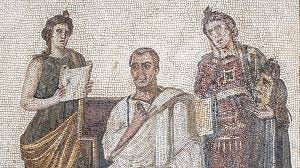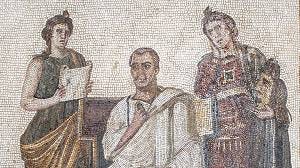Therefore we do not lose heart. Even though our outward man is perishing, yet the inward man is being renewed day by day. For our light affliction, which is but for a moment, is working for us a far more exceeding and eternal weight of glory, while we do not look at the things which are seen, but at the things which are not seen. For the things which are seen are temporary, but the things which are not seen are eternal. —2 Corinthians 4:16-18
You may think that I begin with the biblical verses above in order to encourage you in the good work of dedicated language study and acquisition, but not so. Any such effect is ancillary.
Instead, a famous phrase from this passage will provide us with an example of what I consider to be the primary personal benefit of learning a language.
Before I get into that, however, I wish to put myself on the record regarding reasons for learning. The primary reason to do anything at all in life has to do with our relationship with God: we do things for his glory, and to enjoy him. We should learn because we love God and his Creation; this is part of what makes up the truth of Chesterton’s maxim that “anything worth doing is worth doing badly”. The pursuit of truth, beauty, and goodness as the pursuit of the Divine, as the working out of our love for God, is what makes for the glory of building model trains, or the wonder of keeping a vivarium. It’s not actually the utility, or personal benefit, that justifies these things.
Once we accept this, the benefits certainly may be considered. They may even make the difference between choosing one path or another. But the benefit of learning tinkering and engineering with model trains is meaningless if the deeper expression of our love for God, no matter how much clumsier, would have been found in the passionate keeping of a vivarium. And in fact, the pursuit of these lower benefits stymies the pursuit of the greater ones: nobility and grace, for example.
Aaaaaaaaaaaaaaaanyway…
Now that I’ve amply proven I’m no utilitarian, and perhaps lost half my audience, let me get into benefit: the greatest benefit to you of knowing another language besides your native tongue.
Let’s look at the phrase weight of glory in 2 Corinthians.
C. S. Lewis seems to have loved the expression. It became the title of an address he gave at a church in Oxford, and eventually, the title of a book of collected speeches and essays. In his address he makes much of two beautiful conceptions of glory, one centered around weight/gravity, one around light/prominence.
In the posthumously published book Letters to Malcolm, he says:
The Hebrew idea of God’s glory (kabod) seems to me far closer to the truth than the Greek idea of doxa. The difference between the Hebrew and Greek ideas of glory is very noticeable. For the Hebrew it is closely connected with the idea of weight (kabod), for the Greek with that of light or radiance (doxa). The ‘weight’ of glory suggests something of its sheer solidity and unchangeableness; the ‘light’ suggests something more fleeting, more of an appearance. Of course, both are metaphors, and both are needed. But I suspect that the Hebrew is the more profound.
I think that most of us think of light and prominence when we think of glory. This is faithful to Latin thinking (clarus, or bright, and gloria, related to renown and knowledge) and to Germanic (wuldor, blǣd, beohrt, scite, bright blades and shining shields).1 And, thanks to Saint Paul, this is a biblical way of thinking.
God…has in these last days spoken to us by His Son, whom He has appointed heir of all things, through whom also He made the worlds; who being the brightness of His glory2…
But note that it is a Biblical way of thinking about glory. There’s another, the Hebrew idea of weightiness.
Lewis himself tends to think of glory in terms of light, I think. Both his address and Letters to Malcolm are full of light language and surface speech when speaking of glory. Yet he says he suspects the Hebrew way may be more profound; there’s a logic to that which we can easily see…light is superficial, weight suggests depth. In the Hebrew conception, something could be glorious in the dark. Something dark could be glorious.
Notice the movement in Paul’s words in 2 Corinthians. He begins by speaking of the inner man, then he assures us that our suffering is building up for us a weight of glory while we look at those things which are unseen. Why? Because it is the unseen things which are eternal.
It would be confusing to use a concept for glory that relies on light for this, so Paul reaches across to the language he used all his childhood for the study of the Scriptures under men like Gamaliel: he speaks of the weight of glory but doesn’t say kabod. He writes in Greek.
This, I think, is the greatest benefit of speaking another language. I would say “of studying” or “of learning”, but I want to push this to the max, to where you have something of the soul of the language, and the language has something of your soul.
Your conceptions of a concept (I was going to say “idea of a concept”, but why flee from repetition?) are shaped by the words you associate with it, which associations are created by all speakers. A word is never a point. There is a cloud of meaning around every word, a cloud with definition, but diaphanous and dynamic, occasionally drifting. The relationship between the word and the speakers is reciprocal, each informing the other.
Online word clouds are a thing for a reason. Certain words agglomerate onto others. The nebulous imagery being used does not suggest opaqueness or confusion, but amplitude.
The weight of glory is striking precisely because it’s outside a known cloud. And yet, as soon as we hear it, it makes sense, it resonates, it creates an image in the mind and strikes the heart.
Speaking other languages presents the gift of multiple concept clouds to the speaker. The clouds can be manipulated by the speaker, which is powerful. Even more powerfully, that speaker is unwittingly (or, at least, involuntarily) shaped by the clouds. The amplitude expands.
This is a rich part of what some classical educators have taken to calling “copiousness”, after Erasmus’ De Utraque Verborum ac Rerum Copia.
This is not only actio and elocutio, but a broader and more poetic inventio which strikes etiam fortior into the delivery, into the ear of the hearer.
Is a wilderness full of overgrown nature, or devoid of human life?
Is civilization a cultural word, or a political?
Is pity an affliction, or a grace?
Which is worse, loneliness or solitude?
Why not both? or either?
If you learn to speak another tongue, your tongue will learn not only new trills and clicks, but the thrill of new tricks, new angle, new doors, new poesies. This is an important part of increasing your mastery of yourself and the world around you, to the glory of God.
Now that the article is over, here is the part where I plug myself.
Would you like to have me as your one-on-one Spanish or Portuguese teacher? Click here.
Are you a homeschooler in high school? You can enroll in a beginning or intermediate Spanish class with me next year at Kepler Education. Click here.
Follow my Substack dedicated to the translation of Don Quixote into English.
Check out my recent translation of Mark Rico’s poem Saudade, along with explanation.
Finally, keep an eye out for my textbook (late high school/early college) on the appreciation and composition of poetry, forthcoming from Roman Roads Media and
.Thanks for reading, everyone!
Interestingly, light is universally associated with glory in Indo-European languages. Outside of that great umbrella it is not an uncommon association, but it is far from universal. I leave you no sources, for my study of this is light and unserious. If you wish to pursue the idea, I wish you joy.
Yes, I think Paul wrote Hebrews. This is from Hebrews 1:1-4. The apaugasma of his doxa, the forth-light, radiance, effulgence of his glory.





I need to get back into Greek. And Latin. 😎
I wish I knew another language. How hard do you think learning another language is for an adult, who is surrounded by other, predominantly, English speakers?